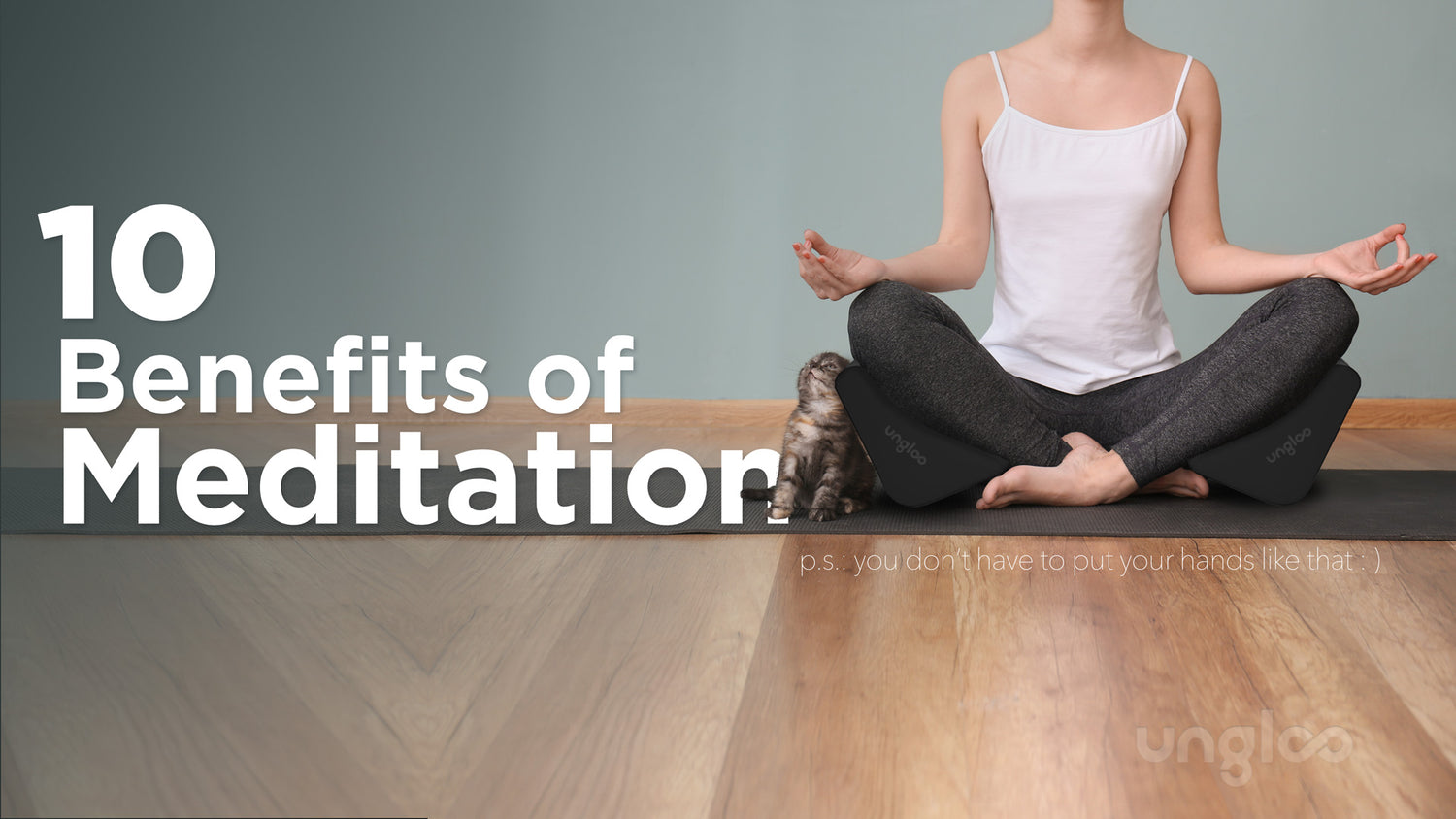Meditation is something that people have been engaging with for more than 5,000 years. Historically, meditation has been a religious pursuit or philosophical tradition, but modern meditation is geared toward wellness, happiness, and general self-improvement.
In addition to centuries-long standing as a religious practice, meditation is also picking up a laundry list of scientifically-backed benefits. We're going to look at 10 benefits of meditation today, giving you some insight into why this practice is something you should consider doing.
We hope the ideas below inspire you to try meditation for yourself. Let's get started.
How to Meditate
Before we start discussing the benefits of meditation, let's take a brief detour and explore how to meditate.
Note that there are myriad ways to meditate. Different styles exist all around the world. That said, the general method of mindfulness meditation is as follows.
The practitioner sits cross-legged or in a comfortable chair, keeping the spine in alignment. Imagine a string pulling the top of your head up and another string tugging down your tailbone. You can close your eyes or keep them slightly open, so long as your eyes aren't wide open.
Then, the goal is to simply fix your awareness on your breathing. Riding the wave of "in.." and "out..," you do your best to focus on the cycle of breathing. Gradually, you will find that you relax.
As thoughts come, try to recognize them as passing thoughts or moods. Avoid attaching to them, however intense they might be. Remember that your goal is to focus on your breath, and any thoughts that distract you from that can be let go.
10 Benefits of Meditation
It sounds simple, but it's harder than it seems. Alright, now that you have a good idea of how it works, let's see what happens when you can make a habit out of it.
We also want to emphasize that meditation can be done anywhere. In your car, on a plane, etc. You might find the most benefit when you try to meditate outdoors, though.
Being outside and grounding yourself in nature is an incredibly powerful thing to do. You might find that it's easier to meditate outside as well. Rather than the hum of a refrigerator or the buzz of your cell phone, you can focus to the tune of a flowing river.
You can hear the birds chirp along to the sound of your breath. There are myriad benefits to being in nature in general, and combining those benefits with meditation definitely produces a synergistic effect.
There are also numerous tools you can use to incorporate meditation outside. It might be difficult to find a comfortable place to sit for an extended period of time. The answer could just be to bring a comfortable meditation seat along with you.
Explore your options for outdoor meditation seating and see if anything stands out to you!
The following are ten of the most notable benefits of mediation, although there are numerous other benefits that couldn't fit in this list.
1. Reduced Stress Levels
The first and most notable benefit of meditation is that it reduces stress. It does this in a couple of ways.
First, the process of meditation serves to send oxygen throughout the body, slow the heart rate, and calm the mind. All of those factors reduce stress and anxiety in the moment.
Developing a regular meditation practice allows individuals to use the skill of mindful breathing in any instance that they're feeling stressed. They might also incorporate mindfully breathing into their daily lives and keep a lower resting level of stress throughout the day.
Another effect of meditation is a generally lower level of stress even after the meditation practice is over. Even after one or two meditation sessions, research shows that individuals have lower levels of cortisol, the primary stress hormone.
2. Anxiety Management
Anxiety, whether it's the result of a mental illness or excess stress, is a difficult thing to get a hold on. Anxious thoughts pervade our sleep, our work, relationships, and more.
The difficult thing about these thoughts, in many cases, is that they're rapid and hard to calm. There's a sort of "chicken and egg" situation with anxious thinking as well; it's hard to know whether the thoughts produce the anxiety, or a resting state of anxiety produces the anxious thoughts.
However anxiety might start, meditation has an excellent way of improving symptoms. On the physiological level, meditation can slow the heart rate and calm the central nervous system. These are two things that can reinstate feelings of calm and focus, reducing the general severity of anxiety.
On the thinking side of things, meditation is an excellent way to take a break from anxious thoughts. Further, meditation and getting a firmer grasp on your state of mind allows you to look at thoughts without as much judgment.
Thoughts that seemed overwhelming before might become easier to break down, understand, and resolve.
3. Critical Thinking Skills
We tend to think of "critical thinking" as something we do in response to literature, art, or different pieces of media.
In the case of meditation, critical thinking simply means thinking about your thoughts. We rarely take time to step back and reflect on the way that we're thinking or the things we're thinking about. It's very easy to go through life assuming that all of your thoughts and perceptions are correct.
As you sit in meditation, viewing thoughts of different kinds as they roll by, you might start to take a third-person perspective on those thoughts. You can look at them objectively rather than feel as though they're a part of you.
4. Emotional Management
Thoughts and emotions have a clear connection. The ability to manage thoughts with a sense of self-awareness plays a big part in the way you can manage emotions.
Emotions are more difficult to manage, in most cases. Meditation allows you to look at your emotions with more objectivity. If the emotion is a stressful one, taking some time to breathe and calm down with mindfulness might help a great deal.
5. Lower Blood Pressure
Evidence suggests that individuals with a regular meditation practice can reduce their blood pressure. It's difficult to pinpoint the exact reason for the reduction, however, because meditation also impacts things like distress, anxiety, heart rate, and more, all of which impact blood pressure.
6. Digestive Issues and Illness
It might seem like a stretch, but it's true!
Meditation may have the ability to reduce symptoms of digestive issues like IBS. A study found that, in a group of 75 women with IBS, there was a significant reduction in IBS symptoms in the control group asked to meditate regularly.
7. Reduced Depression
Anxiety has been shown to reduce symptoms of depression.
If practitioners keep a regular meditation schedule for periods of (roughly) eight weeks or more, odds are that symptoms of depression will decline.
There are a number of potential explanations for this, including an altered perception of events, reduced anxiety, more manageable emotions, and a calmed physiology. That said, it's difficult to say.
In any case, meditation can surely provide a little relief from the difficulties of depression if a practice is cultivated and maintained.
8. Improved Attention and Focus
Meditation is essentially the practice of focusing. You're focusing on your breath, something that many people would see as "boring." Although the breath turns out to be more and more interesting as you watch it, it's true that there isn't much to it at first.
You're just focusing on something that isn't very stimulating. This refines your ability to focus on one thing for an extended period of time. You're faced with the challenge of focusing on your breath despite your thoughts.
Once you master that, you can easily spend a little more time on a book, reading an article, or talking with a friend.
9. More Compassion
Beautifully, one of the side effects of meditation for many people is compassion. In many cases, mediation's purpose is to help develop compassion.
This could happen through meditation for any number of reasons. Maybe you'll just have more attention to devote to the people around you, allowing you to better understand them. Further, your exploration into your own thoughts might help you realize your connection and similarity to other people.
In any case, a little more compassion is something we could all use!
10. Better Sleep
Individuals with trouble sleeping might benefit a great deal from meditation. Even those with chronic insomnia might have an easier time getting to sleep and staying that way through the night.
It's also worth noting that sleep plays an important role in mental illness, physical wellbeing, and much more. All of the aspects of life that meditation benefits have a way of feeding into one another and creating a chain of benefits.
Want to Learn More About The Benefits of Meditating?
So, is meditating good for your health? The answer is a resounding "Yes!"
We hope our look at reasons to meditate was useful to you. There are far more than 10 benefits of meditation, though. We're here to help you learn more.
Explore our site for other ideas about meditation, strategies, meditation products, and a whole lot more.




1 comment
John panther
Thanks for sharing about Meditation benefits. Its very helpful and will recommend this blog to others for sure
Thanks for sharing about Meditation benefits. Its very helpful and will recommend this blog to others for sure